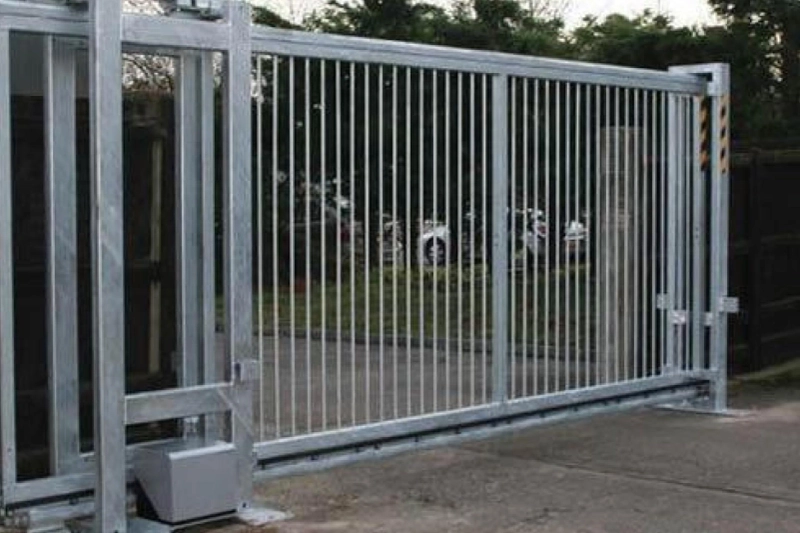In the realm of business security, the importance of physical barriers cannot be overstated. While security systems such as alarms and surveillance cameras play a crucial role in safeguarding commercial properties, the implementation of high-quality gate operators can significantly enhance security measures. This blog explores the myriad ways commercial gate operators contribute to business security, their various types, and the key factors to consider when choosing the right system for your needs.
The Role of Gate Operators in Security
Gate operators are motorized systems that control the opening and closing of gates. They can be integrated with various security features to enhance overall protection. Here are some of the ways these systems contribute to a more secure business environment:
Controlled Access: Gate operators provide controlled access to a property, ensuring that only authorized personnel can enter. This is particularly valuable for businesses with sensitive information or valuable assets.
Deterrence: A well-maintained gate operator acts as a deterrent to potential intruders. The mere presence of a gate and its operator suggests a higher level of security, discouraging unauthorized individuals from attempting to breach the premises.
Automated Monitoring: Many gate operators come with automated monitoring systems that can be integrated with surveillance cameras. This allows real-time tracking of who enters and exits the property, enhancing oversight and enabling quicker response to suspicious activities.
Emergency Access: Gate operators can be configured to allow for emergency access. In the event of a fire or other urgent situations, emergency responders can be granted swift entry without compromising the gate’s security features.
Types of Commercial Gate Operators
Understanding the different types of gate operators and their functionalities can help businesses select the most appropriate system for their needs. Here are some common types:
Swing Gate Operators: These are designed for gates that swing open. They are ideal for driveways and parking lots. Swing gate operators can be installed with various control mechanisms, including remote controls, keypads, and intercom systems.
Sliding Gate Operators: Suitable for gates that slide horizontally, these operators are often used in settings with limited space. Sliding gate operators are robust and can handle heavy gates, making them ideal for large commercial properties.
Barrier Gate Operators: Commonly used in parking facilities and controlled access areas, barrier gate operators use a horizontal bar to block or allow vehicle entry. They are often paired with ticketing systems or access control systems for efficient management.
Key Features in Commercial Gate Operators
When selecting a gate operator for your business, consider the following features to ensure you get the best security solution:
Durability: Commercial gate operators need to withstand constant use and various weather conditions. Look for operators made from high-quality materials with rust-resistant properties and robust construction.
Automation and Remote Access: Modern gate operators often come with automation features and remote access options. This allows for easy control from a distance and can be integrated with smartphones or control panels for convenience.
Safety Sensors: Safety sensors prevent gates from closing on vehicles or pedestrians, reducing the risk of accidents. These sensors can be crucial in high-traffic areas.
Integration with Security Systems: The ability to integrate with existing security systems such as surveillance cameras, alarms, and access control systems enhances the gate operator’s functionality.
Emergency Override: Ensure that the gate operator includes an emergency override feature. This allows manual operation of the gate in the event of a power failure or other emergencies.
Backup Power Supply: A backup power supply ensures that the gate operator continues to function during a power outage, maintaining security and access control.
Installation and Maintenance
Proper installation and regular maintenance are crucial to ensure the longevity and effectiveness of gate operators. Here are some best practices:
Professional Installation: Engage a professional installer to ensure that the gate operator is installed correctly. Proper installation can prevent issues related to alignment, motor function, and safety.
Regular Maintenance: Schedule regular maintenance checks to keep the gate operator in optimal working condition. Maintenance should include inspecting and lubricating moving parts, checking the electrical system, and ensuring that safety sensors are functioning properly.
Timely Repairs: Address any issues or malfunctions immediately to avoid compromising the gate’s security features. Prompt repairs prevent minor issues from escalating into major problems.
Conclusion
Incorporating commercial gate operators into your business’s security strategy offers numerous benefits, from controlling access and deterring unauthorized entry to integrating with advanced security systems. By understanding the different types of gate operators, key features, and best practices for installation and maintenance, businesses can select the most appropriate solution to safeguard their properties effectively. Investing in a high-quality gate operator system not only enhances security but also contributes to a more controlled and efficient business environment. As security threats continue to evolve, staying ahead with advanced gate operator technologies ensures that your business remains protected and secure.



